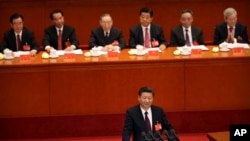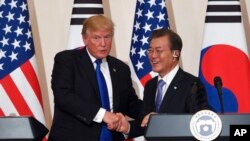United States President Donald Trump will meet with Chinese President Xi Jinping in Beijing soon after Xi was named to a second term as China’s leader.
Trump is on a major trip to Asia visiting Japan and South Korea to build ties before coming to China. The two leaders have expressed notably different international policies.
Xi has often talked about his goal of carrying out the “Chinese Dream” since taking office in 2012.
Xi says the dream is aimed at building a “modern socialist country.” He has promised to make China a leading world power by 2050, while improving the quality of life for all its citizens.
The “Chinese Dream” has also been a major slogan for the country’s ruling Communist Party. It appeared on many signs across Bejing last month during the party’s 19th Party Congress.
Speaking to the Party Congress, he said he was committed to reaching out to the rest of the world to lead China into an important new period. “No country can alone address the many challenges facing mankind,” he said. “No country can afford to retreat into self-isolation.”
Some experts considered those statements as an indirect answer to U.S. President Donald Trump’s “America First” policies.
One example of this policy was Trump’s decision earlier this year to withdraw the U.S. from the 2015 Paris climate change agreement. Trump said the agreement – signed by nearly 200 countries – would hurt the U.S. economy and American workers.
Many nations criticized the U.S. move. President Xi has since voiced support for the Paris agreement. China has taken steps toward reaching its anti-pollution goals. It also is seeking to reduce its dependence on fossil fuels and increase its use of renewable energy sources.
Climate change is one example of where Xi is seeking to expand China’s international influence. Denny Roy is a senior fellow at the East-West Center in Honolulu, Hawaii. He says Xi has also been building up China’s control closer to home.
"The countries that are near China are deferential to China. They don't make foreign policy choices that are at odds with Chinese goals. That would also help to establish China as the preeminent country in the region, which I think has been a Chinese goal for a long time."
Another example of China’s foreign policy is the “Belt and Road” project. The proposal seeks to connect China by land and sea to other parts of Asia, Africa and Europe. China has invested billions of dollars in nations involved in the project.
Roy says the “Belt and Road” project shows China can put a lot of resources toward a single, long-term goal. He notes that this is possible without a two-party political system getting in the way.
“It also emphasizes the image that the Chinese want to project, that as China grows, the rest of the world will grow along with it.”
David Lampton is the director of China Studies at the Johns Hopkins University of Advanced International Studies. He says Xi is attempting to expand China’s part in world issues.
Some experts suggest the U.S. and China could team up to share leadership on major international issues. But Lampton says he does not think conditions are right for such a partnership.
“Right at the moment, I don't think the political and strategic stars are aligned in either China or in the United States.”
Trump's Asian trip
Before heading to China, Trump visited Japan and South Korea as part of his Asian trip. Among the top issues expected to be discussed in Beijing will be trade relations and North Korea’s nuclear weapons program. Both were issues discussed with Japan’s Prime Minister Shinzo Abe and South Korea’s President Moon Jae-in.
Trump has called on China to fix an imbalance in trade and to open its markets to more US investments. In South Korea, Trump called North Korea’s nuclear program a "worldwide threat that requires worldwide action.”
“It makes sense for North Korea to come to the table and make a deal that is good for the people of North Korea and for the world,” Trump said.
Trump has repeatedly urged China to help pressure North Korea to stop developing nuclear weapons and to end missile tests. But Lampton says Trump’s trip is not likely to change China’s position that it has limited influence over North Korea’s actions.
”So I think this trip we're going to see China resisting what it would call undue pressure from the United States to engage in an unrealistically coercive policy towards North Korea, and instead Beijing would argue that we should negotiate more.”
However, Lampton says as Trump continues to face political pressures at home, he will seek some kind of victory in China.
“So, I think for him to be seen as effective in dealing with China is very important, not only to the future of Asia, but also to his political standing in the United States.”
I’m Bryan Lynn.
Bryan Lynn reported this story for VOA Learning English, with additional material from the Associated Press and Reuters. Mario Ritter was the editor.
We want to hear from you. Write to us in the Comments section, and visit our Facebook page.
_____________________________________________________________
Words in This Story
slogan – n. word or phrase that is easy to remember and used by a group or business to attract attention
challenge – n. a difficult task or problem : something that is hard to do
afford – v. be able to do something without difficulties
retreat – v. to move backward
deferential – adj. acting in a particular way in response to the opinions or influence of others
at odds – adj. not agreeing with each other
preeminent – adj. more important, skillful, or successful than others: better than others
align – v. to line up in a row
coercive – adj. using force or threats to make someone do something








